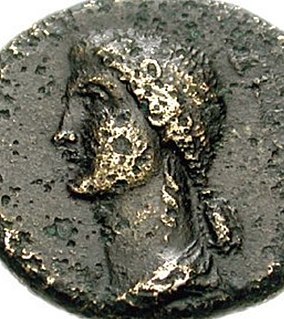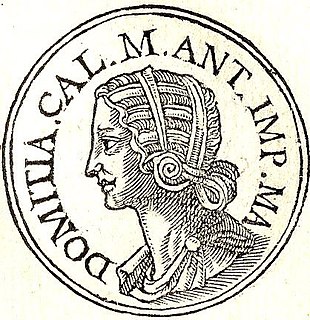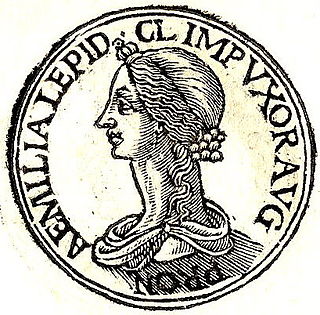
Julia Agrippina, also referred to as Agrippina the Younger, was a Roman empress.

Domitian was a Roman emperor who reigned from 81 to 96. The son of Vespasian and the younger brother of Titus, his two predecessors on the throne, he was the last member of the Flavian dynasty. Described as "a ruthless but efficient autocrat", his authoritarian style of ruling put him at sharp odds with the Senate, whose powers he drastically curtailed.

The Julio-Claudian dynasty comprised the first five Roman emperors: Augustus, Tiberius, Caligula, Claudius, and Nero.

Titus Caesar Vespasianus was Roman emperor from 79 to 81. A member of the Flavian dynasty, Titus succeeded his father Vespasian upon his death.

Gnaeus Domitius Corbulo was a popular Roman general, brother-in-law of the emperor Caligula and father-in-law of Domitian. The emperor Nero, highly fearful of Corbulo's reputation, ordered him to commit suicide, which the general carried out faithfully, exclaiming "Axios", meaning "I am worthy", and fell on his own sword.

Domitia Longina was a Roman empress and wife to the Roman emperor Domitian. She was the youngest daughter of the general and consul Gnaeus Domitius Corbulo. Domitia divorced her first husband, Lucius Aelius Lamia Plautius Aelianus in order to marry Domitian in AD 71. The marriage produced only one son, whose early death is believed to have been the cause of a temporary rift between Domitia and her husband in 83. She became the empress upon Domitian's accession in 81, and remained so until his assassination in 96. She is believed to have died sometime between AD 126 and 130.

Julia Drusilla was a member of the Roman imperial family, the second daughter and fifth child of Germanicus and Agrippina the Elder to survive infancy. She was the sister of Emperor Caligula. She also had two other brothers, Nero Julius Caesar, and Drusus, and two sisters, Julia Livilla and the Empress Agrippina the Younger. She was a great-granddaughter of the Emperor Augustus, grand-niece of the Emperor Tiberius, niece of the Emperor Claudius, and aunt of the Emperor Nero.
Junia Lepida was a Roman noblewoman who lived in the first century.

Milonia Caesonia was Roman empress as the fourth and last wife of the emperor Caligula from their marriage in AD 39 until they were both assassinated in 41.
Domitia is the name of women from the gens Domitia of Ancient Rome. Women from the gens include:

Julia Flavia or Flavia Julia and also nicknamed Julia Titi was the daughter of Roman Emperor Titus and his first wife Arrecina Tertulla.
Junia Tertia, also called Tertulla, was the third daughter of Servilia and her second husband Decimus Junius Silanus, and later the wife of Gaius Cassius Longinus.

Domitia Calvilla, was a noble Roman woman who lived in the 2nd century. She is best known as the mother of the Roman Emperor Marcus Aurelius.
Vistilia was a Roman matron of the gens Vistilia known by her contemporaries for having seven children by six different husbands; Pliny the Elder was more impressed by the fact most of her pregnancies were remarkably brief. Five of her sons became consuls, her daughter Milonia Caesonia became Roman empress through her marriage to Caligula, and her granddaughter Domitia Longina became empress through her marriage with Domitian. Due to her fertility Vistilia became a byword for prodigious fecundity in antiquity.

The Roman Actor is a Caroline era stage play, a tragedy written by Philip Massinger. It was first performed in 1626, and first published in 1629. A number of critics have agreed with its author, and judged it one of Massinger's best plays.

Aemilia Lepida was a noble Roman woman and matron. She was the first great-grandchild of the Emperor Augustus.
Lucius Aelius Lamia Plautius Aelianus was a Roman senator.
The gens Domitia was a plebeian family at ancient Rome. The first of the gens to achieve prominence was Gnaeus Domitius Calvinus, consul in 332 BC. His son, Gnaeus Domitius Calvinus Maximus, was consul in 283, and the first plebeian censor. The family produced several distinguished generals, and towards the end of the Republic, the Domitii were looked upon as one of the most illustrious gentes.
Annius Vinicianus was a Roman senator during the later part of the first century. He is best known from a failed plot to overthrow Nero in 66.